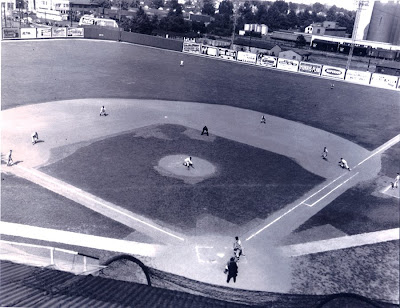Louisville's Parkway Field

Just finished the writing and producing the Spring issue (Vol. 8, No. 3) of the American Association Almanac on the topic of Parkway Field in Louisville, home to the Louisville Colonels from 1923-1956.
In many way it is a fun and fascinating story.
This issue is now on its way to the Almanac's 87 subscribers and is available to the general public at a cost of $10 postpaid.
Researched comprehensively throughout and containing numerous informative graphics, this issue of of the Almanac describes how Parkway Field came into being. Beginning with the early negotiations for land rights,this publication narrates the story of the Colonels’ home park from 1923-56.
A variety of pearls were unearthed in the telling of this story. The result is a 25,000-word edition filled with a variety of anecdotes and other "fun facts" sure to please even the most discriminating baseball history enthusiast. This is not a statistical compilation. Neither is it a picture book. It is baseball history at its leanest and meanest and includes the narrative of many “firsts” such as the pioneering of the legless seat in American baseball parks, the employment of the first female club treasurer and secretary (the Knebelkamp sisters) of a professional ball club, the appearance of five future Hall of Famers in one game, including Earle Combs, in the season’s home opener, and much more. Oh, and did I mention the Shannon brothers, Joe and Red? They were twins who opposed each other on the field during the Parkway Field inaugural against the Toledo Mud Hens on May 1, 1923.
Baseball fans will enjoy the expanse of details explored in this edition, including a detailed description of the Parkway Field opener, key dates during the 1923 season, critical physical features of Parkway Field, attendance patterns from 1923-56, and the four no-hitters, including the controversial performance by Tom “Lefty” Sunkel, the only no-hitter ever to occur during an American Association playoff game in September, 1946.
Numerous graphics, from photos to tables, enhance this high-powered edition. It may not be a Louisville Slugger, but its straight-grained, hardwood approach to baseball history will connect with your appetite for a good story that brings to mind the golden years of our grandparents' brand of baseball.
This limited edition of the American Association Almanac was originally published for subscribers, so please act promptly to insure your copy of this well documented and thoroughly researched account of early baseball in Louisville.
Please contact me at pureout@msn.com to find out how to order.



Comments